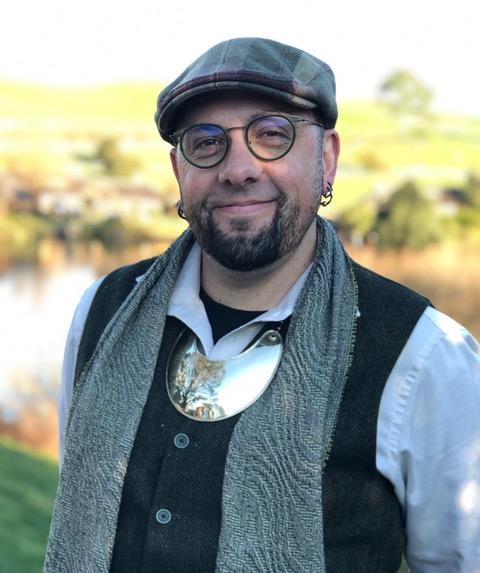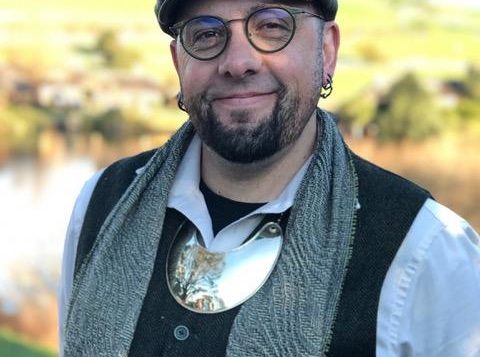I FIRST came across Daniel Heath Justice on the podcast Medicine for the Resistance (which, full disclosure, is cohosted by my friend Patty Krawec). He’s been a recurring guest on the podcast, and throughout these interviews I have found his navigation of complicated topics to be full of nuance, humility, and humor, even as he maintains an informed and vigorous point of view. Those interviews led me to read some of his works.

Justice grew up in rural Colorado, the son of a Cherokee man and white woman. As a little boy, he was always drawn to stories, whether in written or oral form. This impulse led him into literature studies, first as an undergrad at the University of Northern Colorado and then while earning a doctorate in English from the University of Nebraska, where he specialized in Native American literature.
He currently teaches at the University of British Columbia (Vancouver) in their First Nations and Indigenous Studies program. He is an enrolled citizen of the Cherokee Nation. He has published extensively in literary theory and history, his best-known book being Why Indigenous Literatures Matter. He also has published a trilogy of fantasy novels, loosely inspired by matriarchal Cherokee traditions, released in a single volume as The Way of Thorn and Thunder: The Kynship Chronicles. He recently published Raccoon, his second volume in Reaktion Books’ Animal series of cultural histories. He has been contributor and editor to anthologies of both fiction and literary criticism, including volumes exploring gender and sexuality.
This interview was conducted via Zoom in late July.
Neil Ellis Orts: Do you remember when you first started writing?
Daniel Heath Justice: As soon as I could write, I was writing stories. I still have the very first book I ever wrote. I was five, and it was made from paper plates stapled together, and it was a story about bald eagles. In 1980, there was a lot of anxiety about the long-term viability of bald eagle populations because of pollution, so I wrote a book about saving bald eagles. I illustrated it, too. My mom saved it.
NEO: Did you always know you were gay?
DHJ: No, I didn’t. Other people assumed I was, but I didn’t. I didn’t quite understand male gender codes and expectations of masculinity. Most of my friends were girls, and I was a very fey little boy. I actually didn’t think I could possibly be gay because I didn’t have crushes on the boys I was around. I just didn’t find them particularly interesting. And the women I liked on TV were larger than life: Lynda Carter as Wonder Woman, Dolly Parton, Crystal Gayle. These very over-the-top women; they were the ones who compelled my attention.
I was really lucky that neither of my folks treated me as though I was somehow not adequate as a man. Even my dad, who was a hunter, an outdoorsman—kind of a good ol’ boy in a lot of ways—was very indulgent. We would go hunting and I’d carry a fantasy novel with me in my orange vest, and they’d plunk me at the base of some ridge, and as long as I was still doing my work, he didn’t care. I would read my novel, and the minute I’d hear the elk coming through the timber, I’d put the novel away and I’d get my rifle ready.
So, I was raised with a lot of stereotypically masculine activities but I was very fey. I was about eighteen when a woman friend had a gay porn magazine, Blue Boy. It was a revelation to me. I’d never seen men who were unabashedly looking for the sexual gaze. It was beautiful, it was an amazing thing. That was just before I went to university, where I started to buy gay porn. My way of justifying it was, I didn’t want to contribute to the dehumanization of women by buying straight porn. So, it was actually a feminist act to buy gay porn as an ostensibly straight man. I had all kinds of justifications! It wasn’t until I was in grad school that I actually had sex with a man for the first time.
NEO: How was coming out to your family for you?
DHJ: My parents were married until my dad passed away a couple of years ago. I came out to my mom very shortly after I came out in grad school. It was a really hard few months for us. My mom wasn’t a homophobe, but she was kind of the black sheep of her family, and she had always been told that we were too close and that she was going to turn me gay. It was hard for her, but when she came around, she came around in a really big way. My dad and I never talked about it, not once. I would bring my boyfriends home, we would stay in the same room, sleep in the same bed, and Dad never said anything about it. Dad didn’t really much care for my first husband, mostly because he was a vegan and not very social. When my current husband and I first started dating, my mom’s first question was: “He’s not a vegan, is he?” Now my mom and my husband are super-close. Dad just didn’t have the vocabulary for it. He loved me, and he loved whoever I was with. And he really loved my husband. One Christmas—I guess we’d been together for about five years—Dad called me down to his gun room and he said: “Thinking about giving him a gun for Christmas; do you think that would be okay?” My husband, being a proper Canadian, didn’t really understand what that meant, but in our family, getting a gun meant you were part of the family.
NEO: Do you think having to navigate between two cultures makes it more likely that one might move among multiple genres and forms?
DHJ: Yes, absolutely, but the caveat is that I walk through the world with light-skinned privilege. Being a Cherokee Nation citizen who was raised outside the Nation by a disconnected but phenotypically Native dad, in a working-class town—all of those things have informed the sensitivities of my work. But I also have a lot of privilege walking through the world as a light-skinned, cis-male-identified person. It’s a very different experience than my dad had as a phenotypically Native man. We were lucky to be in a town where he was well known and he didn’t deal with a lot of racism in our home town, but he sometimes did when we would leave this world. I’m kind of a stealth minority. People will say things around me that they wouldn’t say around more phenotypically Native people, so I get to see a particularly ugly side of stuff, but I’m also not subjected to overt violence and profiling. And add another complication: I loved my dad dearly, but he was also really anti-Black. He had dealt with racism all his life, but it didn’t sensitize him to other people’s pains. Sometimes it sensitizes you, and sometimes it makes you look for someone lower in the hierarchy. It’s always messy.
NEO: How would you sum up who you are and your work?
DHJ: I definitely identify as having been raised very rural and working-class, and I think those commitments still very much inform my work, even though I’m now a professor living outside of Vancouver. I think the experiences of queer folks in rural communities are part of the audience that I hope my work respectfully represents and speaks to.
Neil Ellis Orts, a writer based Houston, is the author of the novella Cary and John (Resource Publications, 2020).





